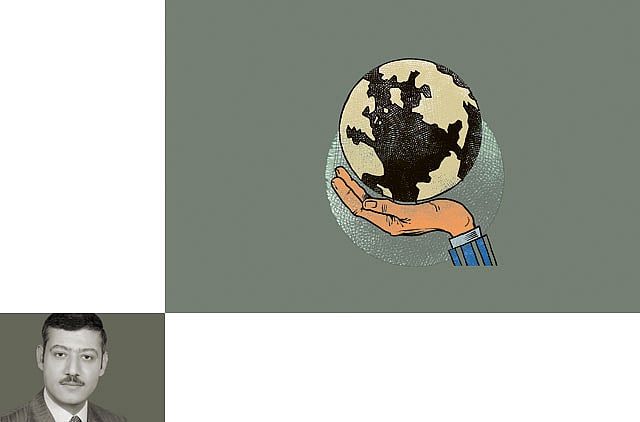The lack of progress in Nato's war efforts to drive Colonel Muammar Gaddafi out from power is mainly attributed, according to most analysts, to the reluctance of the US to contribute in any major way towards achieving this objective. It seems that the Obama administration simply wants to teach the key European powers, those who have always complained about the hegemonic policies of the US in the international system, that without Washington's war efforts they cannot win a battle against a humble military machine such as the one commanded by Gaddafi.
In fact, since the end of the Cold War the US has been trying to prevent the emergence of new competitors that would eventually challenge its position as the supreme power in the international arena. Washington has repeatedly stated that it intends to do all it can to maintain its pre-eminence after the collapse of its old rival: the Soviet Union. Over the past two decades, the national security strategy of the US has consistently reflected a relentless effort to ensure that no other nation could rival America's military strength.
Reactions to the United States' gradual ascent to a hyperpower status have been predictable nonetheless: coalitions of competitors have emerged. The EU, Russia and China have tried in a persistent manner to end US hegemony and return the world to a more balanced system. The 2003 invasion of Iraq presented a golden opportunity to achieve this objective through the UN. But the UN, which managed to limp along and function adequately in more tranquil times, proved incapable of performing under periods of great stress. It was, however, the division among the great powers that was the key to the failure of the international community to constrain the US.
The war in Iraq exposed deep tensions between those who advocated a unipolar system and those who favoured a multipolar one. The diplomatic clash between Germany, France and Russia on the one hand and the UK, Spain and Italy on the other rendered the check on the US dominant position useless. More important, the disagreement between the major European powers on how to deal with the US has made it less likely that at a future point Europe could put an end to the unipolar nature of the international system.
Since the end of the Cold War, the French, and to a lesser extent the Germans, have sought to create a more balanced international system. France's former foreign minister Hubert Vedrine openly called for the establishment of a multipolar system in 1998. He said: "We cannot accept ... a politically unipolar world," and "that is why we are fighting for a multipolar" one. His boss, President Chirac, has also battled tirelessly to create a multipolar world in which Europe becomes the counterweight to American political and military power. Chirac said: "any community with only one dominant power is always a dangerous one and provokes reactions".
Multipolar system
Germany, although it joined the cause late, nevertheless became a highly visible partner in the effort to confront American hegemony. Former foreign minister Joschka Fischer stated that the "core concept of Europe after 1945 was and still is a rejection of ... the hegemonic ambitions of individual states". Germany and France "share a common interest in not delivering ourselves into the hegemony of our mighty ally, the United States", Fischer added.
The Chinese and the Russians, two powers from outside the EU, have joined ranks and expressed solidarity with the idea of a multipolar system. The only great power, apart from the US, which did not share the others' concerns, was Britain. It positioned itself not only as an opponent of anti-Americanism, but also as a defender of US hegemony, undermining all efforts to bring about a multipolar system.
When the Libyan civil war broke out, France, supported by the UK this time, stepped in and tried to play a leading role in an attempt to consolidate Europe's position as a major world power. Consumed by the Greek financial crisis and eager to salvage the Euro, Germany did not share their interest with the French and was reluctant to contribute in any major way to the war efforts in Libya. Russia and China opposed Nato's military campaign against Gaddafi. While the US did not oppose a leading European role in Libya, it nevertheless sought to teach the Europeans a lesson that without a major US involvement they cannot accomplish any major military objective in the international arena. Clearly, the divisions amongst the great powers has helped the Americans maintain their status as the world sole superpower. This situation is likely to endure and the advent of a multipolar world has to wait until this picture fundamentally changes.
Dr Marwan Kabalan is a lecturer in media and international relations, Faculty of Political Science and Media, Damascus University, Syria.
Sign up for the Daily Briefing
Get the latest news and updates straight to your inbox
Network Links
GN StoreDownload our app
© Al Nisr Publishing LLC 2026. All rights reserved.
